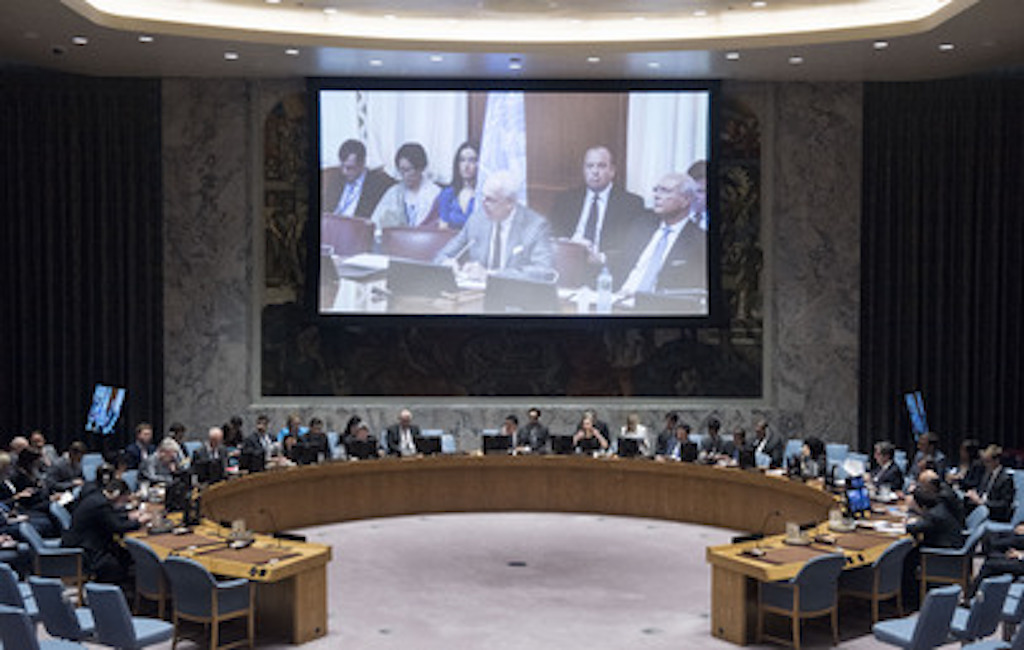During a UN Security Council meeting dedicated to the Syrian’s crisis, The Special UNSG Envoy Staffan De Mistura stressed that it is time to have a technical consultative process between the Syrian government and its opposition in order to expedite formal, diplomatic talks in Geneva.
However, intra-Syrian negotiations were conducted in Astana, Kazakhstan back in February, which was a sign of progress. The UNSG Special Envoy for Syria confirmed that a greater coordination effort could be reached due to reports from negotiations experts in the high opposition committee that significant progress on the Cairo and Moscow platform. These two groups were in a joint set of UN meetings in the same room substantively discussing the whole day. He said that this joint set of meetings highlighted similarities and common ideas on both of their political issues.
The government of Syria was the first to commit to the new diplomatic approach proposed by the Special UNSG Envoy on a technical process and will participate in joint consultation meetings. He encouraged invitees of intra-Syrian talks to prepare actively on issues such as governance, constitutional issues, counter terrorism and security. De Mistura himself says he wants to “accelerate peace talks” and “share some of his own thinking.” Additionally, he wants to involve his team on a closer engagement with women in Syria, listening to “their own suggestions.”
De Mistura stated that despite efforts conducted by the UN Humanitarian Air Services (UNHAS) regarding missing people and abductees, there has been a lack of humanitarian efforts in places where it’s needed the most in the Syria. However, there was no mention of a plan to fund this “lack of humanitarian effort.” UN Emergency Relief Coordinator Stephen O’Brien, whose Office for the Coordination of Humanitarian Affairs (OCHA) co-produced a UN-backed report on humanitarian aid workers in highly militarized war zones said, “‘Conflict parties’ lack of respect for the fundamental tenets of international humanitarian law and the brutality and volatility of today’s armed conflicts make it extremely difficult and dangerous for these brave aid workers to deliver humanitarian assistance and protection in complex emergencies.”
Also, the Special Envoy never addressed the recent report about the operation in Raqqa where more than 500 civilians got killed and fighters against ISIS were injured and killed because an anti-ISIL coalition airstrikes. The Permanent Representative of France to the United Nations, François Delattre, commented on the report and said, “you know that the Coalition is doing the very best it can to avoid civilian casualties. This is a top priority for the members of the Coalition in our common fight against terrorism. And the takeover of Raqqa is a national security priority for France,” but insisted that “new phases of negotiation in Syria [are a] key priority for us while we are seeking a democratic transition in this country as soon as possible.”
When the UK Deputy Permanent Representative to the United Nations, Ambassador Peter Wilson, was approached with the question of whether the UK shares the same concerns as the US that a chemical weapons attack could be imminent in Syria, he responded with, “I think we’ve always made our position on chemical weapons clear, which is why we supported the last US strikes. If there is evidence of further issues with chemical weapons then we would act as and when we hear that information.” As a follow-up, the press asked Ambassador Wilson if the US had shared any evidence of an attack with the UK to which he retorted with, “I’m going to let the US answer that question.”
It seems ironic that the Special Envoy of Syria is emphasizing more of a shared dialogue between opposing forces when countries on the same team aren’t even on the same page in the UN. Hopefully the Special Envoy’s plan that further joint technical discussions involving all opposition parties will increase dialogue at the G20 summit in Hamburg on the 7th-8th of July.
In a Security Council meeting held on Wednesday, June 28, the Council readdressed the need for all Member States to achieve the universal implementation of resolution 1540 (2004) after the horrific use of sarin gas on Syrian civilians in August of 2013. UN inspectors worked tirelessly under pressure to broker a temporary ceasefire with the regime and the rebels in Damascus, the Syrian capital.
..
In the Council meeting, the UK Deputy Permanent Representative to the United Nations, Ambassador Peter Wilson, acknowledged the hard work conducted by the Joint Investigative Mechanism in Syria that brought to light, “what happens when terrorists’ hateful intent is paired with these equally hateful weapons [WMD]. We saw the results in Daesh’s sulphur mustard attack on Marea in August 2015, leaving residents blistered and burning. Other cases are also under investigation. Clearly, preventing weapons of mass destruction falling into terrorist hands is a vital lynchpin for preserving international peace and security.”
The Deputy Permanent Representative of Italy to the United Nations, Ambassador Inigo Lambertini, said that, “we take the opportunity to emphasize the need to achieve the universal implementation of resolution 1540 (2004) and the importance for States to submit their first national implementation reports. Despite undeniable progress, the non-proliferation regime continues to be confronted with serious threats and recent, alarming developments have clearly demonstrated that no State is immune to this danger.”












